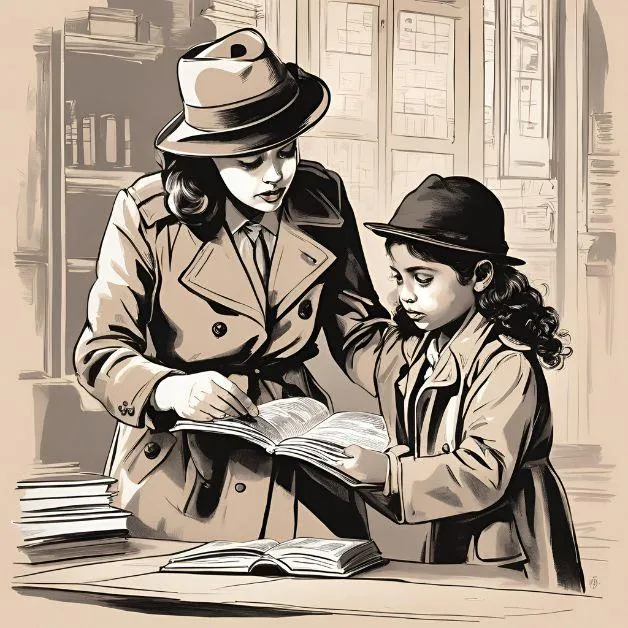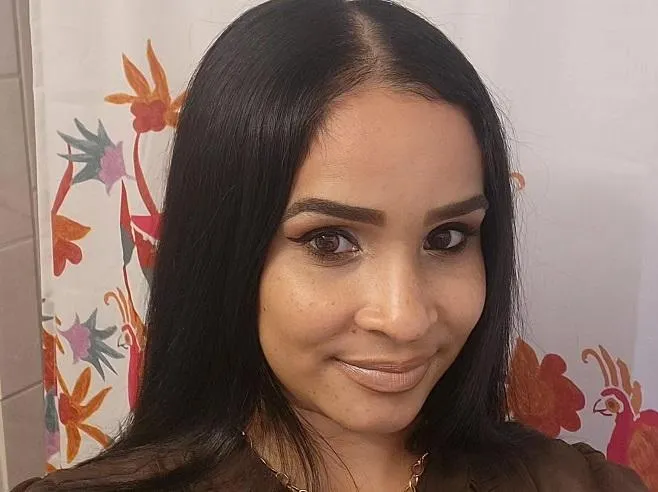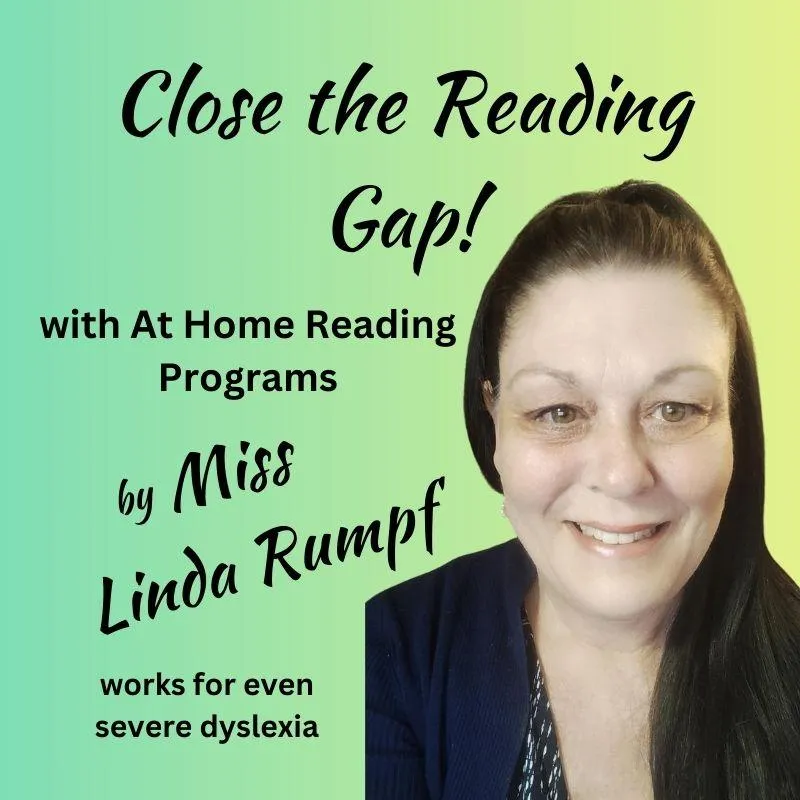
Linda Rumpf, Reading Tutor
Overwhelmed by a reading issue? Let's Fix This!
Miss Linda specializes in raising fluency rates of readers who, after "years in the system," are still not reading on grade level.
Does the reading gap seem to keep widening as the years pass?
Does your student's reading gap affect spelling and writing, as well? Do you suspect dyslexia, working memory delays, or other issues which were either never identified or not addressed effectively by the school system or IEP?


Reading aloud to a skilled listener builds reading fluency.
At the heart of what Miss Linda does is prolonged reading aloud. Anyone who has played a sport or learned a musical instrument knows that practice is the key to becoming proficient at any activity. Having students read aloud for extended periods of time to a skilled listener who can help correct mistakes IN THE MOMENT, otherwise known as Continuous Reading (CR), has been scientifically proven to increase reading fluency (Hammerschmidt-Snidarich et al, 2018).
Becoming reading detectives!
Miss Linda teaches kids and parents to work with a "mental map" of spelling, syllabication, and pronunciation rules and phonics patterns that give students with dyslexia tools they can use to help sort out words that might initially appear jumbled to them. If we know the basic patterns we are looking for, the brain can help the eye to rearrange letters to find these patterns.
You and your child become reading detectives, using logical reasoning (connecting what you see or experience in the moment with what you know) to take what may seem like a confusing mess to your child and finding order. We crack the code!


Set up your own
At Home Reading Program!
Miss Linda's At Home Reading Program starts with six weeks of initial tutoring of a student. During this time, the parent, grandparent, or other adult reading partner also attends training with Miss Linda (at a different time than the student's lessons). The student and their reading partner get set up to successfully carry forward their at home reading program independently.
Learn to teach your child like a pro! No outside curriculum needed! If you can read, you can do this!
Listeners are trained to write down miscues (mistakes) as the reader reads. Then, the listener/teacher conducts a simple phonics lesson related to the miscues. A phonics progression chart is also used to make sure all letter combinations are taught, even if they don't come up in the reading.
You can take up teaching your own child after the initial six weeks of child tutoring and parent coaching or opt to have Miss Linda continue teaching your child. Miss Linda's students--even those with severe forms of dyslexia-- regularly gain reading fluency at the rate of one grade level per three months of tutoring with her twice or three times per week. The rate at which your child gains grade levels through your home reading program will largely depend on the frequency of your lessons.
A Passion for Assessment
Miss Linda has a passion for extensive assessment. Most times, thorough assessment is not available in the school setting. Miss Linda starts with a professional assessment of fluency, memory and comprehension ability. And observational assessment remains ongoing, through each lesson! She continually and carefully examines each student's individual reading situation, gathering more clues each time they read. She cracks the code! She has been able to identify more uncommon forms of dyslexia, such as dysphasia. She succeeds where other dyslexia interventions have failed. Miss Linda is currently studying and conducting research on master's level reading instruction and assessment techniques.

How it Works

Book a Free Consultation. It will include a professional reading assessment, so Miss Linda can pinpoint the student's exact fluency level and reading issues. This also is a meet and greet between Miss Linda and the student, and is a great way to put aside any fears students might have about reading aloud to a listener. The student will read aloud to Miss Linda from reading passages shown on the screen during a Zoom call. Miss Linda makes it fun and "no big deal." Miss Linda maximizes student strengths while conversing with students to create a highly motivating and confidence-building experience for a struggling reader.

After the assessment, talk with Miss Linda about how long it would take to close the reading gap. Miss Linda's students achieve one grade level in fluency per three months of tutoring twice per week. This is true for even her students with severe dyslexia. So, for example, if the student tests as two grade levels behind, they would need six months (with Miss Linda) to achieve grade level fluency. Parents who opt for six weeks of intensive tutoring for the child with training for the parent in setting up their at home reading program will vary in their results, depending on how dedicated the parent is to keeping the reading schedule. It is possible for an at home reading program, if followed with commitment, to provide very quick results, as reading sessions can potentially be as frequent as desired.

Choose plan:
1. Ongoing tutoring with Miss Linda until student has reached grade level reading fluency, or
2. Intensive six weeks tutoring for child with concurrent training for parent in how to continue the at home reading program going forward, or
3. Receive assessment results with no obligation and use as needed, such as to advocate for a student in a school or work setting.
Testimonials from some of Miss Linda's clients:

Chanel
(Parent of 9th grader)

"Linda has been my son's reading interventionist for a little over 5 months now, and it has been one of the best investments I've ever made! My experience with her has been a complete 180 from previous tutors and programs. She has been a Godsend!"

Madelyn
(college student)

"It has been a year since I have been working with Linda, and it has
been a blessing to come across her service...well-rounded, patient, knowledgeable, understanding...
Linda is the tutor that you are looking for."

Dominic
(mechanic)

As an adult who struggled with reading since elementary, I'd never quite found the proper teacher/tutor. That’s until I found Linda. Linda has helped me identify and bridge the gaps in my reading. Linda makes learning fun and engaging. Even for an adult in his 30’s. I highly recommend Linda. It’s never too late.
Reach out here for more info on Miss Linda's At Home Reading Programs and Tutoring!
Frequently Asked Questions
Why can't I read very well?/Why cant my child read on grade level? The problem is usually related to undiagnosed dyslexia or other undiagnosed reading issues. Recently, school children have also been affected by Covid learning loss. There may have also been issues with ineffective teaching in the classroom.
Lorem ipsum dolor sit amet, consectetur adipisicing elit. Autem dolore, alias, numquam enim ab voluptate id quam harum ducimus cupiditate similique quisquam et deserunt, recusandae.
Why can't the school system fix the problem? In the 90's, the U. S. school system removed phonics-based reading teaching and switched to an approach of teaching kids to memorize whole words. By 2000, the federal government mandated that phonics instruction be included back in the reading curriculum, but the damage had been done. Many adults were not taught properly how to decode words (through phonics, or the process of "sounding out" words). To remedy this problem, many remedial reading teachers now use methods based on the Orton-Gillingham approach which involves re-teaching phonics in order and systematically. However, simply reteaching concepts more slowly and carefully doesn't always solve a reading issue. Phonics is important, but research has now shown that something else is required to close the reading gap.
Why does continuous reading (CR) work? Reading, like other multisensory activities such as playing a sport or musical instrument, requires continuous practice of the activity itself in order to improve one's performance. Phonics study breaks reading down into various concepts which can be taught, but all that learning must be integrated back together into the act of reading. Most teachers and tutors spend their precious lesson time "teaching" concepts instead of letting the students actually practice reading in front of them for a significant length of time.
Understandably, reading aloud is difficult to do in a group setting, for fear of embarrassing children who do not read well. While this is a valid concern, and we certainly do not want to traumatize kids in front of their peers, the student with a serious reading issue does need to practice reading aloud to a skilled listener who can correct their mistakes, or they will not improve. Silent reading has been shown to increase word knowledge but also mistakes, because we tend to skip over words we don't know or wouldn't be able to pronounce out loud.
Though it is highly beneficial to develop a habit of reading to oneself, we now know that silent reading cannot be relied upon to build fluency any more than just re-teaching phonics can. Continuous reading (CR), or reading aloud to a skilled listener (one who can correct mistakes immediately) for extended periods of time, multiple times per week, is what research has shown actually works to increase reading fluency.
Lorem ipsum dolor sit amet, consectetur adipisicing elit. Autem dolore, alias, numquam enim ab voluptate id quam harum ducimus cupiditate similique quisquam et deserunt, recusandae.
